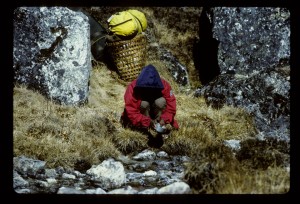Rachmaninoff, Sergey Vassilievich: Moments Musicaux, Opus 16, No. 5, 1896.
Listen to the author reading the text
 The pianist Arthur Rubinstein heard Rachmaninoff play in a simple way only once. It was at the end of Rachmaninoff ’s life, and he said to Rubinstein that he had wanted to play only simply, but that the world had imposed virtuosity on him. Rachmaninoff of course imposed it on himself, in order to proselytize his music, to turn his poetry into the prose of more prosaic feats, not that the virtuosity wasn’t marvelous in itself—it was more than virtuosity really, lush and textured and creative; Rachmaninoff had the ability to compose in other people’s music.
The pianist Arthur Rubinstein heard Rachmaninoff play in a simple way only once. It was at the end of Rachmaninoff ’s life, and he said to Rubinstein that he had wanted to play only simply, but that the world had imposed virtuosity on him. Rachmaninoff of course imposed it on himself, in order to proselytize his music, to turn his poetry into the prose of more prosaic feats, not that the virtuosity wasn’t marvelous in itself—it was more than virtuosity really, lush and textured and creative; Rachmaninoff had the ability to compose in other people’s music.
Much vilified by pedants for his popularity, the impoverished, silent, aristocratic genius, stripped like Nabokov of family, country, pride, wealth, familiarity, comfort, and reality, found some small comfort, as did Nabokov, in drawing the bars of his cage, concealing the apple orchards of childhood dapple behind the crowd-pleasing chords of schmaltz.
Sadly, the pedants have a point with much of Rachmaninoff, with his predilection for dated jazz even in the otherwise gorgeous concerti, with his whining schmaltz in the Vespers. And yet the Etudes Tableaux, the Préludes, the Variations on a Theme of Paganini rise out of the failures so felicitously, like roses out of swamps, that it becomes obvious we must see beyond any artist’s weaknesses to his strengths, or, to quote John Donne out of context, “else a great prince in prison lies.” As Walt Whitman said, great audiences make great poets, as well as great composers. We get what we deserve.
 Here Rachmaninoff, long before café society’s delight with the rhythms of Rio, fits a syncopated Carmen Miranda samba in between the midsummer strum of the Russian balalaika, occasionally letting the bass bongos echo the sad Copacabaña salsa in the treble. The swaying, drunken left-hand Viennese barcarolle and the suave Brazilian dance weave a Ginger Rogers silk that can only be spun from D flat.
Here Rachmaninoff, long before café society’s delight with the rhythms of Rio, fits a syncopated Carmen Miranda samba in between the midsummer strum of the Russian balalaika, occasionally letting the bass bongos echo the sad Copacabaña salsa in the treble. The swaying, drunken left-hand Viennese barcarolle and the suave Brazilian dance weave a Ginger Rogers silk that can only be spun from D flat.
As the simplest of the six musical moments, it remains relatively abandoned for its confusion of styles, its Chopinesque lilt beneath the sprung rhythms of its Spanish ancestors, like cellos fighting claves and marimbas. As with the Liszt Consolation (track 12), a delicate war wages here between styles and rhythms, or maybe more of a philosophic discussion in a Sevilla café, and resolving its chaos at the start for the sake of clarity sacrifices the point of the piece, which is to arrive at an agreement only at the end. So I hope the listener will pardon the disarray of this impassioned debate.
What makes a D flat tango different from the thousands of similar themes in other keys? Tangos in D major, for example, have an edge, a jangle to them, while this piece is at rest from the start.
Rising out of D flat into crisper, clearer keys, it soon subsides into the submarine seas of its hot tropic beginnings. Harmonies that we have to regard suspiciously, as the key to their key, the code to their cipher has been lost to our generation, reappear, if you listen over and over, with their martini and mango exoticism intact. Learning a piece, you play it ad nauseam and it grows on you. Your victims, often hearing it for the first time in concert, are at a disadvantage, so I recommend the same obsessive repetition for a happy ending. I play it slowly, inner melodies spilling profusely down its walls like bougainvillea.
 Just before this self-effacing Musical Moment ends, it thickens the sauce with the traditional trick of turning a major key into a minor key in the bass. Mozart does this by using a third chord, called the subdominant, to signal the beginning of the end. Nabokov signals approaching death and dénouement by elliptical mentions of butterflies, often in other languages. Before Humbert kills Quilty in Nabokov’s tour-de-force novel Lolita, his nemesis, Quilty, mentions the German philosopher Metterling. Humbert growls, “Metterling, Schmetterling, you’re going to die, Quilty.” Schmetterling is not only another philosopher, but his name in German means butterfly.
Just before this self-effacing Musical Moment ends, it thickens the sauce with the traditional trick of turning a major key into a minor key in the bass. Mozart does this by using a third chord, called the subdominant, to signal the beginning of the end. Nabokov signals approaching death and dénouement by elliptical mentions of butterflies, often in other languages. Before Humbert kills Quilty in Nabokov’s tour-de-force novel Lolita, his nemesis, Quilty, mentions the German philosopher Metterling. Humbert growls, “Metterling, Schmetterling, you’re going to die, Quilty.” Schmetterling is not only another philosopher, but his name in German means butterfly.
But this brief butterfly flirtation with somber death passes after only one note and turns major. All is forgiven, all is resolved back into the contented Sangria of the major key. This is a dance, not a dirge. This major note, a small but vital bird call in the bass, is carried over as the pedal clears away the debris of the night before, and you notice that out of the chaos of thick-tapestried notes, the D flat chord has been created, a small metaphor for the nightclub of tangos and trysts, as the trivial interlude of afternoon infidelities ends dreamily, just before silence falls.
